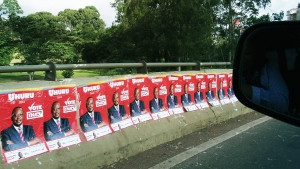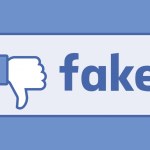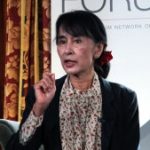A Momentous Ruling In Kenya Undoes A Vote Marred By Fraud, Fear, And Fake News
Updated Sept. 4: Kenya’s Supreme Court nullified last month’s electoral victory of incumbent President Uhuru Kenyatta after finding that the balloting had been tainted by voting forms that were likely fraudulent–the first time that a judicial body has done so in Africa, and only the third time in modern history.
The initial outcome–a landslide for Kenyatta, who won 54% of the vote–had been contested by longtime opposition leader Raila Odinga, whose supporters claimed the vote had been “hacked” by someone using the password of a central election technology official who had been found murdered a week before the vote.
Other shenanigans surrounded the campaigns, including, as I reported, the sudden deportation at gunpoint of the U.S.-based data firm Aristotle, which was working for the opposition and the government-backed raid of a Nairobi voting center.
Privacy advocates also raised concerns about the Kenyatta campaign’s reported decision to enlist the services of Cambridge Analytica, the U.K.-based data and psychographic messaging firm that worked for the Trump campaign and that is partly funded by the political donor and Breitbart News– and Trump-backer Robert Mercer.
Cambridge Analytica’s parent company, the political communications firm SCL Communications, signed contracts with the State Department earlier this year to carry out overseas political messaging. The company did not reply to a request for comment about its reported $6 million contract with the Kenyatta campaign. An Aristotle spokesperson declined to say what it had been paid for its services for the Odinga campaign.
The election—the most expensive in Kenya’s history, costing an estimated $1 billion in total—was also plagued by false news reports on platforms like Facebook, WhatsApp, and Telegram. The torrent, said polling firm GeoPoll, amounted to the most “fake news” around an election ever recorded, with 90% of Kenyans saying they had encountered deliberately false political news.
In its nullification ruling, the court identified problems with the transmission and tallying of votes: It found that many of the paper forms that were required to be scanned and sent from over 40,000 polling stations were never recorded; the results were instead sent by text message and other means. It also found that a third of some 10,000 missing forms submitted days after the election lacked security features like watermarks or serial numbers, which observers said was evidence that the forms were likely false.
Immediately after preliminary election results were announced, Odinga’s supporters claimed that the tally had been manipulated by a hacker, using the password of Christopher Msando, an official who had been instrumental in setting up the country’s voting technology. The bodies of Msando and a female companion were found tortured and mangled in a forest outside Nairobi days before the vote. Police have identified four persons of interest; on Monday, the country’s High Court released one suspect.
In a joint statement, the U.S. and the U.K. said they were “gravely concerned” by the murder, and offered assistance in the investigation. Msando’s family urged the Kenyan government to accept the offer, and asked social media users to be mindful of what they post about the murder: “A lot of the information out there is false and meant to injure and paint the family in a bad light.”
Kerry And Others Gave Preliminary Thumbs-Up
Despite the concerns, the August 8 election was largely peaceful—24 people died in post-election clashes with the police—and was generally praised by international observers in the country at the time, including former U.S. Secretary of State John Kerry, former Prime Minister of Senegal Aminata Touré, and the Carter Center. Kerry conceded “little aberrations here and there,” and observers said they could not verify the hacking claims made by Odinga’s camp, but he and others largely defended the integrity of the election. (Barack Obama, whose father was Kenyan, did not weigh in on the outcome but urged peace after the vote in a letter he posted to Twitter.)
Here, Kerry speaks at a press conference after the election:
Odinga said that international observers who determined that the election was mostly fair and free had “sanitized fraud.”
In a statement it released on Friday, the Carter Center sought to clarify the record, aligning itself with the Supreme Court’s ruling. It said that its “preliminary statement following the election noted that election day voting and counting processes had functioned smoothly,” but that “the electronic transmission of results proved unreliable.” In another statement on Aug. 17, the Center said it urged the Independent Election and Boundaries Commission “to continue to collect and publish the results forms transparently, so that the overall integrity of the process could be verified,” the statement said.
Kerry tweeted the statement, adding, “Some important thoughts from @CarterCenter on the #Kenya Supreme Court Ruling.”
Some important thoughts from @CarterCenter on the #Kenya Supreme Court Ruling. https://t.co/KxjRP9DNK4
— John Kerry (@JohnKerry) September 1, 2017
Still, in comments shortly after the election, Kerry seemed to downplay problems with the electronic transmission of votes. “In the end let me emphasize: it is the paper ballots and the accounting process established by the [Independent Electoral and Boundaries Commission] that tell the story of this election, not the electronic transmission of those numbers.”
The Supreme Court’s decision underscored “a problem with the election observer industry,” Muthoni Wanyeki, Open Society’s incoming Africa director, told France24. “They focus too much on the pre-electoral process and the process of voting. The problems are always with the counting and the tallying. They don’t focus on that enough, they don’t have the resources to look into that.”
Wanyeki described feeling “a real anger about the way [foreign observers] treat” Kenyan civil society activists.
“I’ve had diplomats say to my face that, speaking in the light of history, this election was an improvement [from past elections]. I’m sorry we do not live in history, we live in the here and now and we have a right to free and fair elections. Their attitude in condescending, neocolonial and by saying things are improving, they’re treating us like small children. Hopefully this ruling is like egg on their face.”
The U.S. State Department, which has lately issued travel warnings and security messages based on concerns about election-related violence, issued a statement on Aug 10 urging candidates to dispute results “in accordance with the constitution and rule of law and not through threats or acts of violence.” On Friday, a joint statement by foreign ambassadors to Kenya declared support for the decision. The White House and President Trump, who met with President Kenyatta earlier this year, have yet to weigh in on the election.
Fake News And A “Massive Fraud”
Fears of violence swirled ahead of the election and the decision: Kenya experienced postelection violence after presidential votes in 2013 and 2007, when as many as 1,500 died. After 24 people were killed after last month’s vote, including a baby and a nine-year-old, most of them by security forces, both sides were blamed for not doing enough to prepare their constituents for the results.
Observers also worried that a flood of false stories would exacerbate violence. Facebook even took out full-page newspaper ads and radio ads as part of its efforts to curb misinformation.
#Facebook takes out full-page add in #Kenya newspaper to offer advice on identifying fake news. A brave new world #KenyaDecides #fakenews pic.twitter.com/56R6KVYqWp
— Matina Stevis (@MatinaStevis) August 3, 2017
The company launched a news feed notice in Swahili and English directing users to resources on how to spot false reports “such as checking the web address, investigating the source and looking for other reports on the topic.” Ebele Okobi, Facebook Africa’s director of policy, said in a statement that the company had “a three-part strategy to stop the spread of misinformation: disrupting the economic incentives for the spammers who attempt to distribute false news, building new products and helping people better identify false news and report it.”
It isn’t clear who was behind the fake news, but some speculated that a slick video ad that described an Odinga presidency in explicitly apocalyptic terms was the work of a foreign company.
Kenya in 2020 if Raila Odinga is elected President
Dangerous Raila has a long history of creating poverty, inciting violence and dividing Kenyans.Raila will turn Kenya into Kibera if we don’t stop him. On August 8th, choose progress, choose Uhuru.SHARE to stop Raila and save Kenya!
Posted by The Real Raila on Monday, July 10, 2017
A Cambridge Analytica spokesperson told the BBC that the company was not involved in any negative advertising in Kenya, and that it “has never advocated the exploitation of ethnic divisions in any country.” A spokesperson for Aristotle told me that along with data and polling analysis, it helped Odinga with debate prep and digital and TV advertising; she said the company didn’t spread false news stories, and that much of its work involved figuring out ways to fight fake news.
A new vote, which must be held within 60 days of the ruling, means that candidates will have to start campaigning again. Supporters of Odinga shared their delight in the streets. “I am happy to be Kenyan today,” said Odinga. “It is a historic day for the people of Kenya, and by extension the people of Africa.”
Odinga, who was running for a fourth time, contended he had been robbed of victories in the previous two elections. After Kenyatta won by a tiny margin in 2013, Odinga asked the Supreme Court to invalidate the election; they refused. In early August polls, the two candidates were virtually tied, with neither drawing more than 50%.
On Friday, Odinga called for calm but said that his legal team would take members of the electoral commission to court, saying that they had “committed a criminal act” and belonged in jail. President Kenyatta called on Kenyans to respond peacefully to the decision, which he said he respected even as he branded the judges “crooks.” “Millions of Kenyans queued, made their choice, and six people have decided that they will go against the will of the people,” he said.
John Aristotle Phillips, the founder and CEO of Aristotle, who worked for Odinga’s campaign before he was deported by government agents along with a Canadian colleague, praised the decision. “Today’s ruling is a victory for the Kenyan people and democracy worldwide,” he said in a statement. “This election was a massive fraud, and the court demonstrated great courage given the lengths to which those in government have gone to cling to power.”
Walter Mebane, a professor of statistics and political science at the University of Michigan who studies elections worldwide, ran the voting results through a computer model he and his colleagues developed to detect electoral fraud. Based solely on statistics, the New York Times reported, “and without knowledge of the intricacies of Kenyan politics, he and his team found patterns that showed widespread manipulation.”
Updated: Sept. 4 with statement from the Carter Center, Muthoni Wanyeki of Open Society, and the family of Chris Msando.
Fast Company , Read Full Story
(17)













